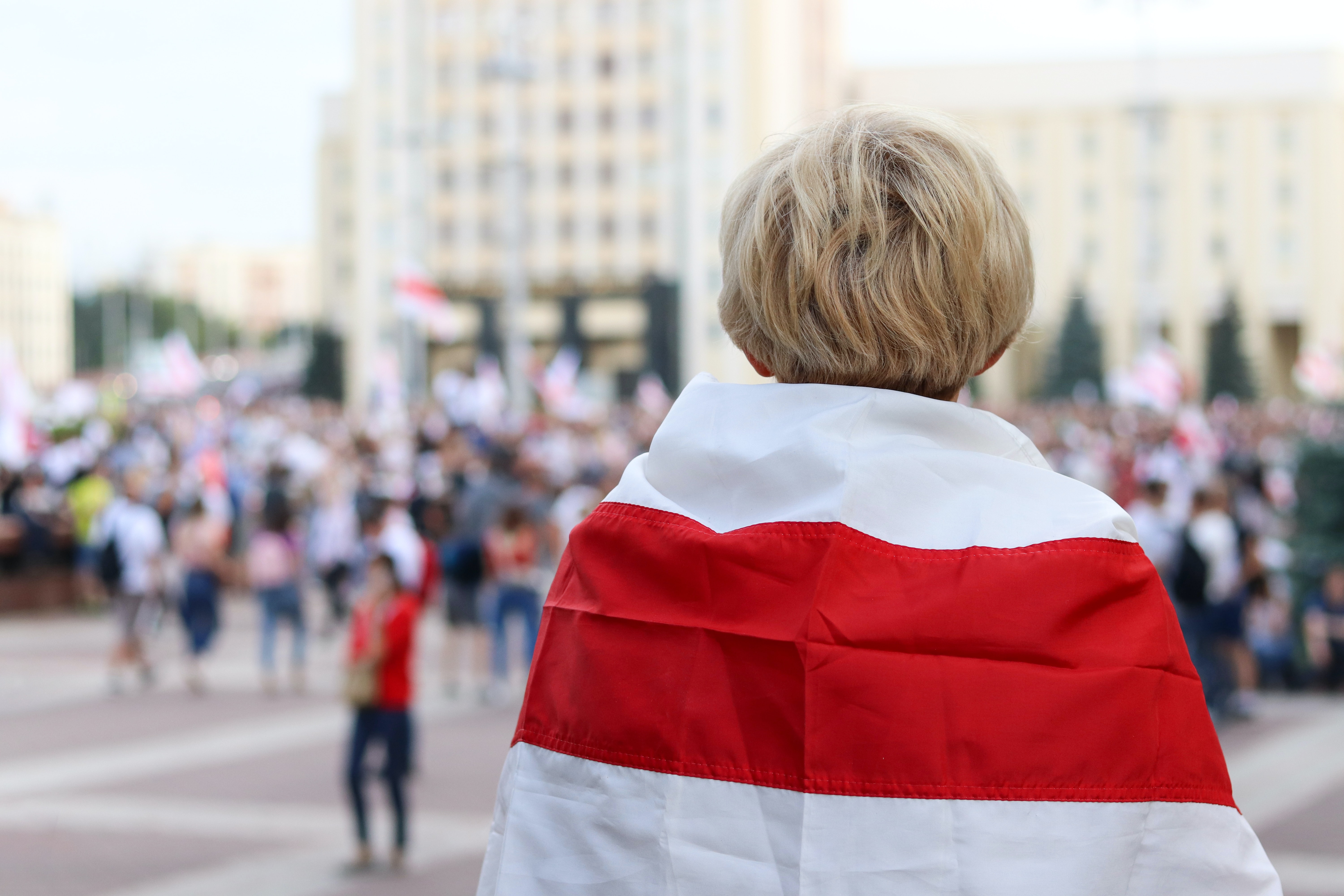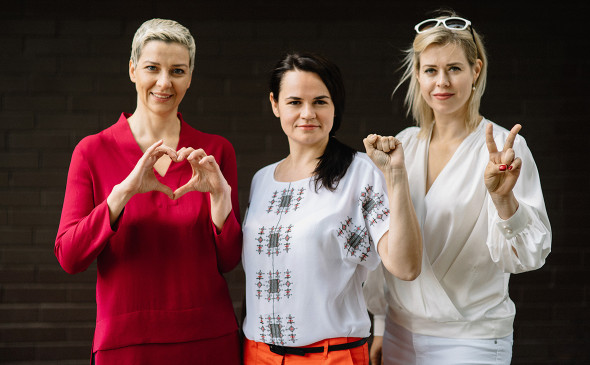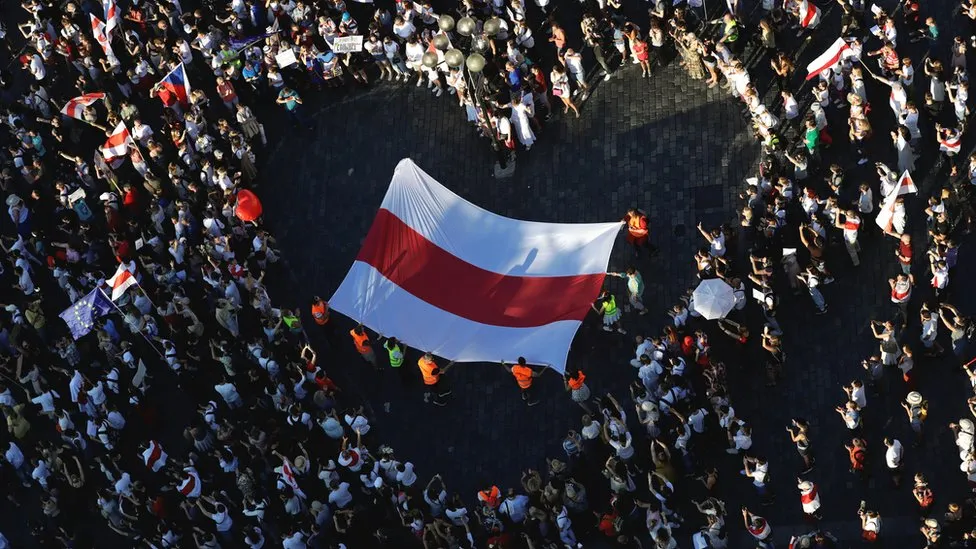
Photo by Jana Shnipelson on Unsplash
You don't care much about the migrants until you become one. And then your life changes on "before" and "after." You go through plenty of situations (mostly not nice ones), try to fit in, build a life, and get your regular back. But it doesn't work. Because you are a stranger everywhere you go.
I'm Kate. I'm Belarusian. And I have not lived in my country for more than two years.
I left Belarus because of what it became after the protests in 2020. I didn't feel safe at my home, I didn't feel comfortable, I didn't feel okay to live there. And I couldn't find a reason to stay.
For two years, I've been traveling around Europe, trying to find a place that could be better for me. But nothing was right. 2021. The war in Ukraine has started. And after this, life abroad became even more complicated.
As a Belarusian, I was targeted a few times on the street by people who didn't know my situation. I was "a shame," a person who "is not welcomed here," someone who "didn't do much and should go home." I understand from where it's coming. But it's not right.
The more upsetting thing is that a lot of people from a lot of countries who left their homes to not be arrested or killed, or basically who were trying to find a better life, have lived through this for many years and continue to face it again and again. I want to talk about it. And I want to show our perspective.
Short recap: What happened in Belarus in 2020?
It all started much before August 9, when we had a presidential election. The situation was heating up during the candidate race. The opposition that year was powerful as never before. And most of them ended up in prison without any chance to participate. They are still there.
After the arrest of Sergei Tikhanovsky – one of the primary opponents of Alexander Lukashenko – his wife registered as a candidate to become president. Two other leaders of the race – Viktor Babariko (who is in prison now) and Valery Tsepkalo (who left the country) – were denied registration. Their headquarters united with Svetlana Tikhanovskaya. They had tremendous support – pickets and demonstrations were held throughout the country.
Caption: Maria Kalesnikava, the head of Viktor Babariko's electoral campaign; Svetlana Tikhanovskaya; Veronika Tsepkalo, Velary Tsepkalo’s wife.
Photo: Victor Babariko's press service
On the day of the elections, people were excited. After getting the result – they were upset and angry.
Pre-election polls gave Tikhanovskaya about 67-71% of the votes, and Lukashenko – 12-20%. According to the “official” vote count, Lukashenko received 80.1%, Tikhanovskaya – only 10.1%. An independent exit poll at foreign polling stations showed completely different results: 86.9% of the votes – to Tikhanovskaya, 3.9% – to Lukashenko. There were no international observers at the elections, except participants from Russia and Azerbaijan.
The United States, as well as the leaders of the European Union, expressed deep concerns about the conduct of the elections in Belarus, noting that they were neither free nor fair, and also condemned the violent response of the authorities to the ensuing protests.
Belarusians felt deceived.
Photo: Belsat
Most of us believed that we had a chance for a good change. But it didn't happen. We wanted to show our disagreement. And peaceful protests turned into scary things.
The first days were shocking. On the second night of the demonstrations, the person was killed. In five days 13 500 people ended up in jail. But protests continued from day to day. And each time more and more people were arrested. As far as till the end of 2020.
Demonstrations began to subside by early 2021. Despite this, people have continued to suffer because of the consequences. During the next almost two years, many Belarusians were arrested or fined. It's happening even now.
Photo: Dmitri Lovetsky/AP Photo
Photo: Vasily Fedosenko/Reuters
Photo: Dmitri Lovetsky/AP Photo
Photo: Sergei Grits/AP
Photo: Reuters
Photo: Tatyana Zenkovich/EPA
As of today, 1 460 people are recognized as political prisoners. Several of them received prison sentences of 10 years or more.
That's our reality. We tried to fight. People were arrested. People were traumatized. People were injured. People were killed.
Some people left the country. So did I.
What happened after for me?
At the beginning of my emigration, June 2021, everything was pretty okay. I've been traveling a lot around Europe. I met people who knew the situation – they supported me a lot. I met some who didn't follow the news – but they were eager to find out what was going on. I didn't find a place to settle down. However, from time to time, I felt at home – around friends and a great community.
When the war in Ukraine started, I was in Armenia. And I'd been visiting Georgia a lot. That was a country where, for the first time, I faced hatred from an unknown person. And it didn't feel good; I guess you would understand me.
I was walking on the street with my friend. We were speaking English. A man, a musician, decided to ask where we were from. He tried to guess. "Ukraine?" – "No." "Russia?" – "No." "But where are you from?" – asked a woman passing by. I said: "My friend is from France, and I am Belarusian." "Shame on you!" – that was the answer.
To make it short, the point of the woman was that I didn't fight a lot during the protests; I left my country just like this; because of me, the Russian army launched rockets toward Ukraine from Belarusian territory, and now I'm occupying Georgia with "all of us" instead of going back and changing the situation. I didn't argue. I just said she doesn't know me, so she is not the one to judge. I was confused.
After a while, I moved to Europe. I started to be afraid of speaking any language but English. I was avoiding the question "Where are you from?" and topics connected to Belarus, Ukraine, Russia, war, migrants, etc.
Some of my friends didn't get it. But I didn't see any other choice since I was getting judgmental sights and harsh statements right after the phrase "I am from Belarus." I got them from people on the streets, hitchhiking drivers, and strangers in the bars. And each time, it was more and more painful. "Belarusian? Not nice, not nice." "In Poland, speak Polish." "We don't want you here." "Go to your country." Or just the even worse silence.
I heard stories about Belarusians being denied the ability to rent apartments, open bank accounts, rent cars, or take flights. Is it even fair?
I think that is what changed my mind and made me start talking about this more. That, and many other people who understand the situation and are ready to support us as much as possible. We did fight. We did suffer. Most of us left the country without a choice. And we are not asking for anything but a safe place and for all of this to stop.
Anyway, enough about me right now. Let’s see if it was the same for other Belarusians. I've asked some of my friends – to show that it could happen to everyone. Here’s what they experienced:
Aliaksiey (3 years out of Belarus)
I left the country at the end of December 2020. The reason was the arrest of my colleagues.
I was working as a journalist in the media that covered social and political news, as well as those connected to the protests. One day, some of my colleagues were arrested. I left right away. I was ready for this.
It was a complicated decision. But I understood what I was doing. I decided that I would stay in Belarus till the first sign. It happened.
The leaving was hard. It was heartbreaking. I didn't know if or when I would see my parents, grandparents, or dog again. But I didn't think at that time it would take so long. I didn't believe that it could last for years.
The first stop was Ukraine. There, I got a visa to Poland, and after a month, I moved to Warsaw. The relocation was fine; adaptation went quite lightly because I already had my other colleagues there. They helped with everything: basics, apartment, papers. The most challenging part was the language. I had a hard time with Polish.
Perhaps this one is on me. It's not that the language is complex, but that I need more motivation to learn it. I mean, I understand it, but not at such a level that will help me immerse myself in society and become a full-fledged member.
In everything else, Poland is good for me. Our cultures are similar, society's values coincide with mine, and people are friendly. Although sometimes the situations happen. As an example, in my neighborhood where I lived in Warsaw, cars with Belarusian license plates were set on fire, they were scratched, and the wheels were punctured. I've heard about it in the news. But I haven't encountered it myself. I was discriminated against only because I am a migrant. Although there is just one case I could highlight.
I was playing soccer with my friends – Belarusians and Ukrainians. And one guy with his wife came to us. Rudely, he said that we have no right to play on this ground because we are occupying it, not letting Polish people play. We didn't fall for his provocation. And he decided to call his friend.
The other guy came in a while. There was some fighting. They were telling us that we should go back to Ukraine. But we replied that we were not from Ukraine; we were Belarusians. In response, we heard: "Belarusians? It's even worse. Go to your Lukashenko!"
I think it was not a complaint that we were Ukrainians or Belarusians. There was a problem with the people. They simply believed that foreigners in Poland are "second-class people" who have no right to do anything. And by the way, afterward, we went to the Polish police, and they opened a criminal case against him, his wife, and his friend for inciting some kind of racial hatred.
The Polish media responded very strongly to this case. I gave some interviews. They wrote a lot about it. And the reaction of Polish society, which I saw in the comments, was really supportive. I think such people as those we met at the soccer playground were rather an exception.
In three years, I had plenty of good situations with the Polish. For example, the landlord of my apartment has always rented the flat to Belarusians only. Before me, there was a Belarusian girl. After me, a Belarusian guy. When she rented the apartment to the next tenant, she said: "I like Belarusians very much. I know for sure that there will be order, that they will send money on time, and I will not have any problems with them". And I was pleased. I was happy that there are people who do not shift the responsibility for war crimes to all Belarusians, who know how to separate Lukashenko and us.
I don't understand the ones who say that Belarus is a co-aggressor in the war. No. The co-aggressor is Lukashenko and his power. It has nothing to do with Belarusians. Belarusians protested, are protesting, and are in prison because of it right now. I am emigrating not of my own free will. Since I am here, as well as hundreds of thousands of Belarusians, it proves that I don't agree with what is going on either.
No one has the right to judge us. The Belarusans have suffered so much that they can not be called enemies. To blame us for not fighting against the regime, it's like blaming a rape victim for being raped. We have to prove our point. And in no case, accept blame, confess what we are not guilty of.
When things change, I will return to Belarus at the first opportunity. If it will be in a year, then it will be in a year. If it's in two weeks, it's in two weeks. My goal is to go back to my country.
For now, I'm going to stay in Poland. I like it here. Although I know that anything could happen. And I am ready for this.
What would I recommend for people emigrating? First, don't allow yourself to be insulted. If it happens, record it and report it to the police, publicly declare that you are being insulted. This is the only way we can somehow fight it. And we have to fight it. We can't just let it go. We should respect ourselves and our nation. We're normal, we're good. We have a right to be here.
Second, explain to people why you are in their country and what's going on. Everyone should know the reasons. Then I hope there will be less misunderstanding.
Also, try to integrate better into the new society and learn the language. I could imagine why the locals don't like us: they come, ask something, and people don't understand. They speak their language in their own country and can't get the answer. Of course, it's annoying.
After all, remember that we are guests here. We should follow the rules and the laws. We should always ask for permission and remember, that we are guests here.
Alina (1,5 years abroad)
I left home about a month after the war started. I did not feel safe in Minsk. Plus, there was a massive fear that at any moment, the borders could close and Belarus would become a prison for ten million people, from which you could not get out.
Initially, I was going to move to Poland, but my boyfriend didn't have a visa, and we had to change the destination to Georgia. We stayed there for six months.
Moving to Georgia felt like a sudden adventure. We made a decision quickly; we didn't plan much. But we were not alone. So, all the problems seemed manageable. The next move – to Poland – was already prepared and more apparent. I couldn't say that we had many troubles.
The most complicated thing for us was to find an apartment. After the war started, the prices increased twice compared to the pre-war period. You had to almost fight on knives for each flat with other people. You had just five minutes to call the apartment owner you liked; otherwise, it would have been rented out already.
The other thing was the reaction of Georgians to Belarusians. The first time we felt a kind of dislike for our nationality was when we came to check on the apartment. There was a big Georgian group: the owner of the place, his family, and some friends – eight people in total. One of them was a very friendly Georgian, super loud and active. He asked us cheerfully where we were from and added: "Ukraine, right?" We said: "No, Belarus". And when he heard the answer, his face changed and became really tense.
We got the feeling of some unfriendliness at that moment from all of them. But they decided to rent out an apartment to us anyway. Later, when my boyfriend went to sign a contract with the head of this Geogian family, they went talking. The owner discovered that we do not support anything happening right now. He brightened up and since then, changed the way he treated us.
Belarusians in Georgia also had trouble with banks and documents. For example, my boyfriend's account was closed at some point without any reason. He couldn't withdraw his money for a while and had to open a new account in another bank just to get them. This kind of problem had even people with residence permits. And no one explained why because they had a right to do so.
But I don't think there was an outright dislike because of who we are from all the locals. There was just a feeling that Georgians had much more understanding and regret for Ukrainians. It is clear: they have left their country, they have a war there, and they have to face Russia – similar problems that Georgians had and have now.
Poland is different for me. I feel like people here are more welcoming and ready to help than in Georgia. Georgians didn't want to engage that much when they heard you speaking Russian. They pretended they didn't understand the language, and switching to English didn't help either. Polish will most likely help you with your problems. Although they would not like it if you speak Russian either.
How people treat you here depends on whether you know and try to speak the local language. Plus, the city you live in matters a lot. I'm in Warsaw, and I haven't encountered any adverse reactions. I'm also learning Polish, so I try to use it as much as possible.
For me, it seems like people in Poland do not have any negativity toward migrants because of their nationality. But they might have some concerns about the way we behave. Some Polish, for example, stopped treating Ukrainians the way they did before. Why so? I guess because sometimes they could be a bit too loud and too much, which makes the Polish feel disadvantaged. One local guy told me that Ukrainians in Poland have a lot of preferences, and it seems like the government of the country doesn't care about its citizens as much as about people from Ukraine.
The reason why Polish people might not like Belarusians is precisely because Belarus is now associated with Russia. And we are just partially affected by this general mood. But I don't see it happening often.
If you have some situation with the locals, I recommend to be smart. There is no sense in trying to prove something to radicalized people: first of all, you can get into some trouble, and second, most likely, you won't change their minds anyway. We should give more context to our acquaintances or neutral people, and explain why we are here and what's going on there. In this way, we can attract people to our side. And maybe the majority of them will start to think about us positively.
Of course, if you see someone discriminating against the other person because of their nationality, you should help them in any way. But remember to use common sense. As a foreigner, you have a good chance of getting into big trouble. Try to avoid it.
I'm personally satisfied with Poland, so I would like to stay here longer. I know that, with a 95 % probability, I am not returning to Belarus. I don't believe that significant changes will take place there in two, three, four years. And even if they do, there is no guarantee that everything will not roll back, unfortunately.
Vadim (1 year abroad)
I had trouble finding a job in Belarus since the war started. My girlfriend moved to Georgia for work. And I decided to join her and try my chances there. It was October 2022.
That was the first time I moved abroad. The hardest part was to make this decision. I had $ 500 in my pocket. I didn't have a job – I hoped to find one there. And I was a bit afraid of leaving what I had in Belarus. But everything worked out for me: with a job, with other stuff – so I stayed.
Life in Georgia was pretty easy. I just had some trouble with the language: not all the locals could understand Russian (or they pretend they can't understand), and my English was not very good.
I heard about Georgian hospitality, but I think now locals treat you differently. The older ones are more neutral, so you would most likely not have problems with them. Adults and young people – depends. Some support Putin and Lukashenko, but some are against them. I experienced a few negative situations, mostly because I spoke Russian.
The first one that I can recall is when my friends visited me. We went to Kojori – a fortress 20-something kilometers away from Tbilisi. And on the way back, when we were waiting for the bus in some village, the group of Georgians in the car stopped next to us. They heard us speaking Russian and, I guess, decided to try getting us. They were staring weirdly, playing Russian songs, saying something. They didn't speak Russian well, so we couldn't converse. But we said that we are Belarusians and all their moves make no sense to us.
The bus came, and we got into it. And one of those guys started shouting something in Georgian with a face that obviously was full of hatred. It was definitely not something pleasant and positive. It left a bit of residue.
The second very vivid situation happened with another friend. We lived in the center of Tbilisi on Liberty Squarу. And there, close to the roundabout, there are a lot of street musicians in the evenings. We came here to listen to the music. Literally, five seconds after we sat down at the bench, one Georgian guy from the group next to us came up to my friend. He heard us speaking Russian and decided to say rudely that he didn't want us there. We told him that we're not Russians, we're Belarusians. He said: "Then go to Belarus to fight the Russians." There was so much hate. And I told my friend, "Let's get out of here" because he had already been getting ready for a fight.
I asked my landlord about why this is happening. He said that it's probably because many people in Tbilisi come from the villages. Some of them might not be aware of the political situation in Belarus. And I could understand it. When I lived in Belarus, I had no idea what was going on in Georgia, who their president was, and what the situation was in general.
Another explanation is that some people you meet in big cities in Georgia are from Ossetia or Abkhazia – territories seized by Russia. They were evicted from their homes, and they certainly have a grudge against Russians. So, whenever you speak Russian, they see you as a Russian. That's why they treat you negatively.
I try to avoid any conflicts and, if it is possible, solve them peacefully. Especially in a foreign country, it could really turn nasty. My health and life are more valuable than proving to some strange dude that he is wrong. But I think when possible, we should tell people why we are here and what's happening in our country. For example, in Sri Lanka, where I live now, I always share things about Belarus with the locals because they don't know anything about it. And they look surprised, shocked, and supportive afterward.
Lankans mostly don't know Belarus. They hear you speaking Russian and consider you to be a Russian. But they don't hate you or judge you because you are a foreigner – they just want your money.
I'm not going to stay here for a long. I plan to go to Malaysia and move to Europe after a while. But I really miss Belarus. I like everything there. It's my home.
Until I'm 27 years old (when you don't need to service in the army anymore), I can't really go back there. But if there are some changes, I will return for sure. I don't know when it will be: in a year, two, or five. But I would like to come back home. I would like to have the possibility to come back.
*This article is part of the Youth Media project, implemented by DCN Global with Gen, știri and Forum Apulum. Read more here.












